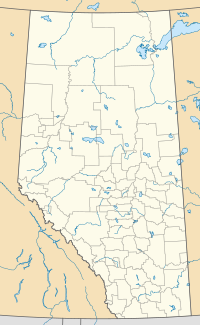Edberg is a village in central Alberta, Canada. It is approximately 31 km (19 mi) south of Camrose.
Edberg | |
|---|---|
| Village of Edberg | |
Location in Alberta | |
| Coordinates: 52°47′03″N 112°47′09″W / 52.78429°N 112.78582°W | |
| Country | Canada |
| Province | Alberta |
| Region | Central Alberta |
| Census division | 10 |
| Municipal district | Camrose County |
| Incorporated[1] | |
| • Village | February 4, 1930 |
| Government | |
| • Mayor | Ian Daykin |
| • Governing body | Edberg Village Council |
| • Deputy Mayor | Jacquie Boulet |
| • Councilor | David Butt |
| Area (2021)[3] | |
| • Land | 0.35 km2 (0.14 sq mi) |
| Elevation | 758 m (2,487 ft) |
| Population (2021)[3] | |
• Total | 126 |
| • Density | 356.1/km2 (922/sq mi) |
| Time zone | UTC−7 (MST) |
| • Summer (DST) | UTC−6 (MDT) |
| Highways | Highway 56 |
| Waterway | Driedmeat Lake |
| Website | Official website |
Johan Edstrom, an early postmaster, named the village after himself.[4]
Demographics
editIn the 2021 Census of Population conducted by Statistics Canada, the Village of Edberg had a population of 126 living in 58 of its 67 total private dwellings, a change of -16.6% from its 2016 population of 151. With a land area of 0.35 km2 (0.14 sq mi), it had a population density of 360.0/km2 (932.4/sq mi) in 2021.[3]
In the 2016 Census of Population conducted by Statistics Canada, the Village of Edberg recorded a population of 151 living in 61 of its 65 total private dwellings, a -10.1% change from its 2011 population of 168. With a land area of 0.35 km2 (0.14 sq mi), it had a population density of 431.4/km2 (1,117.4/sq mi) in 2016.[5]
Notable People
editSee also
editReferences
edit- ^ "Location and History Profile: Village of Edberg" (PDF). Alberta Municipal Affairs. October 21, 2016. p. 260. Retrieved October 23, 2016.
- ^ "Municipal Officials Search". Alberta Municipal Affairs. May 9, 2019. Retrieved October 1, 2021.
- ^ a b c "Population and dwelling counts: Canada, provinces and territories, and census subdivisions (municipalities)". Statistics Canada. February 9, 2022. Retrieved February 9, 2022.
- ^ Place-names of Alberta. Ottawa: Geographic Board of Canada. 1928. p. 46.
- ^ "Population and dwelling counts, for Canada, provinces and territories, and census subdivisions (municipalities), 2016 and 2011 censuses – 100% data (Alberta)". Statistics Canada. February 8, 2017. Retrieved February 8, 2017.
External links
edit
